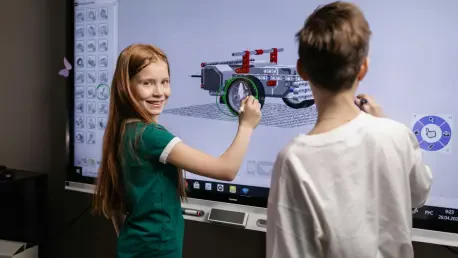In a rapidly evolving world where technological advancements are paramount, nurturing an early interest in STEM (Science, Technology, Engineering, Mathematics) is no longer just an educational pursuit but a societal imperative. Iowa’s STEM Scale-Up program is at the forefront of this mission, aiming to spark innovation among its youngest learners. It has created a comprehensive educational ecosystem that starts in preschool and extends to various community platforms. This initiative not only emphasizes the need for early STEM exposure but also underscores the importance of community collaboration in creating a sustainable pipeline for future problem solvers and innovators.
Importance of Early STEM Engagement
Engaging Curiosity Through Play
The foundational years of childhood present a crucial opportunity to cultivate a deep-rooted interest in STEM, beginning with activities that children naturally engage in, such as play. The Iowa Children’s Museum, through its involvement with the STEM Scale-Up program, has designed initiatives that weave STEM learning seamlessly into play, recognizing that children’s innate curiosity forms the cornerstone of effective learning. By integrating simple activities like block building, the museum introduces fundamental engineering concepts and problem-solving skills in a context children can understand and enjoy. This approach allows young minds to grasp complex ideas without the constraints of structured learning, thus fostering an innate interest in STEM fields.
Building Foundational Skills
Engaging young minds in STEM is not merely about introducing concepts but also about developing problem-solving abilities and critical thinking skills vital for future success. By nurturing a playful yet educational environment, educators and institutions are laying the groundwork for foundational skills. These activities are supported by research demonstrating that early exposure to STEM concepts through play not only boosts cognitive skills but also builds a child’s confidence in their ability to engage in scientific inquiry. As a result, these programs cultivate essential attributes, such as creativity and resilience, which are indispensable in STEM fields.
Expanding Reach Through Community Involvement
Community-Centric Approach
Since its inception, the STEM Scale-Up program has expanded its reach across Iowa’s educational landscape, engaging diverse educational and community settings. By working with a variety of partners, including public and private schools, libraries, and youth organizations, the program ensures a wide dissemination of STEM educational resources. The Southeast Iowa Regional STEM Advisory Board, based at the University of Iowa, plays a vital role in this endeavor by meticulously evaluating applications to support high-quality, adaptable STEM programs. This broad engagement strategy reflects a commitment to making STEM education accessible and relevant to all students, regardless of their educational environment.
Networking and Collaboration Among Educators
An integral part of the program’s success lies in its ability to facilitate a collaborative network among educators. The STEM Scale-Up initiative encourages educators from different schools and regions to come together, share their experiences, and refine their teaching practices. These interactions often occur organically, leading to a robust exchange of ideas and fostering innovation in teaching methods. Such collaboration ensures that educators are not working in isolation but are part of a supportive community that prioritizes continuous learning and improvement. This network not only enhances the quality of STEM education but also builds a culture of shared goals and resources.
Programs and Practical Applications
Curriculum Development and Integration
The STEM Scale-Up program emphasizes practical, hands-on curricula that are easily integrated into classroom settings. For example, the “All About Balance” program at the University of Northern Iowa introduces basic physics principles in engaging ways. Teachers like Jennifer McKneill actively incorporate these lessons into the school curriculum, offering pre-packaged materials and training that provide educators with the confidence and resources needed to implement STEM lessons effectively. This structured yet flexible approach allows for STEM learning to be interwoven into daily classroom activities, ensuring that students at various levels of understanding can participate in meaningful scientific inquiry.
Corporate Partnerships and Real-World Connections
Corporate partnerships play a vital role in enhancing the STEM Scale-Up program’s impact. Collaborations with companies like Collins Aerospace not only provide financial support but also offer real-world applications and experiences for students. Events such as STEM Family Free Night at the museum, where families engage in collaborative STEM challenges, highlight these partnerships. These events demonstrate how classroom learning translates into real-world applications, making the connection between academic theories and practical experiences. Such initiatives also serve to involve and educate parents about the importance of STEM, encouraging them to support their children’s educational journeys.
Future Prospects and Considerations
Looking Ahead
The STEM Scale-Up program in Iowa represents a dynamic shift in how STEM education is approached, aiming to address both educational needs and future workforce demands. By cultivating early interest and building strong community and corporate partnerships, the initiative sets a precedent for STEM education nationwide. As the program evolves, it faces the challenge of maintaining its momentum and ensuring that these early educational experiences result in long-term STEM engagement. The continued success of the initiative will depend on its ability to adapt and respond to the changing technological landscape, leveraging its strong foundation to push boundaries and inspire future generations of innovators.
Sustaining Innovation and Growth
In today’s fast-paced world, where technology is ever-advancing and critical for future success, fostering an early interest in STEM—Science, Technology, Engineering, and Mathematics—is not just an educational goal but a necessity for society. The STEM Scale-Up initiative in Iowa exemplifies this mission by striving to ignite a passion for innovation among young learners. This program has established a robust educational ecosystem that begins as early as preschool and branches out into various community settings. The initiative highlights the significance of exposing children to STEM education at a young age while also emphasizing the crucial role of community collaboration. By doing so, it helps develop a sustainable pipeline of future problem solvers and innovators, ensuring that younger generations are equipped with the skills and knowledge needed to address complex challenges. Ultimately, Iowa’s STEM Scale-Up program represents a proactive step in preparing children for an increasingly technological future, benefiting individuals and society alike.









